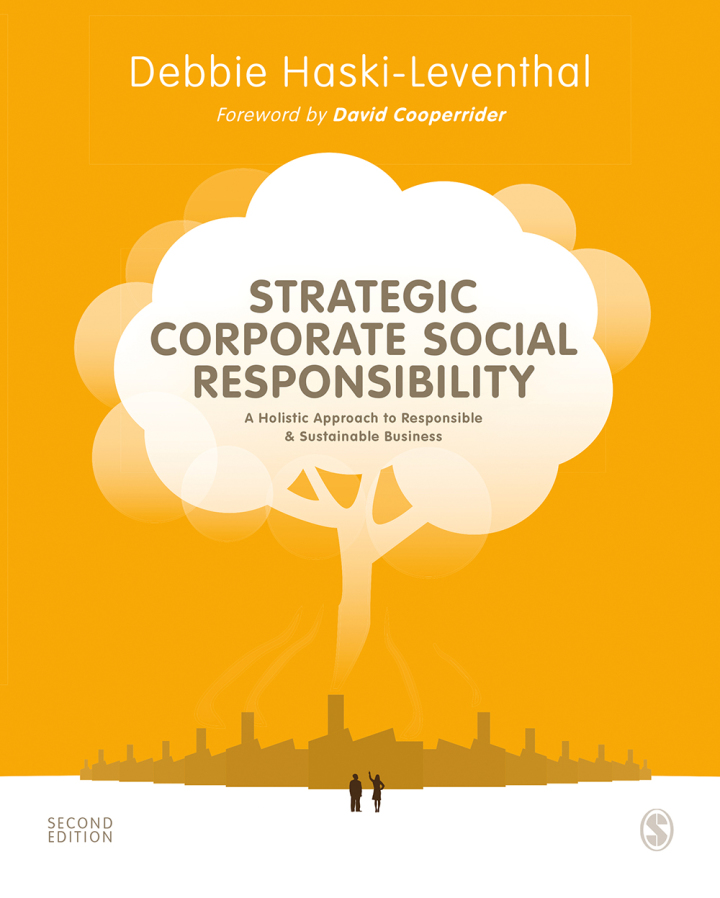
Strategic Corporate Social Responsibility 2nd Edition - A Holistic Approach to Responsible and Sustainable Business
PUBLISHER: Sage
Trường ĐH, Nhóm, Thư Viện: Gọi 0915920514 để báo giá eBook hosting trên Vital Source hoặc mua Sách In
Chiến lược trách nhiệm xã hội của doanh nghiệpPhương pháp tiếp cận toàn diện để kinh doanh có trách nhiệm và bền vữngVới những kỳ vọng ngày càng thay đổi của người tiêu dùng, nhân viên và cơ quan quản lý, việc trở thành công ty tốt nhất thế giới không còn đủ nữa. Các doanh nghiệp hiện nay cũng được kỳ vọng sẽ mang lại lợi ích tốt nhất cho thế giới: có trách nhiệm với xã hội và môi trường, bền vững và có đạo đức. Dựa trên ý tưởng rằng CSR chiến lược đưa ra cách tiếp cận toàn diện và hiệu quả nhất đối với trách nhiệm xã hội của doanh nghiệp, tác giả trình bày các khái niệm, lý thuyết và cách tiếp cận triết học chính về CSR, cùng với các công cụ thực tế cần thiết để triển khai kiến thức này trong thế giới thực. Cuốn sách được chia thành ba phần; phần đầu tiên cung cấp nền tảng lý thuyết về CSR, phần thứ hai xem xét các phương pháp tiếp cận CSR khác nhau và cách chúng có thể được thực hiện và phần thứ ba thảo luận về việc đo lường và truyền đạt CSR. Phiên bản mới này còn có một chương có tựa đề 'The S in CSR: Các vấn đề xã hội và toàn cầu'. Mỗi chương bao gồm các câu hỏi để suy ngẫm và thảo luận, bài tập và nghiên cứu điển hình từ các thương hiệu được công nhận trên toàn cầu như Ben & Jerry′s, Google, H&M, Johnson & Johnson, Nestlé, Patagonia, Puma, Unilever và Whole Foods. Cuốn sách được bổ sung bởi các slide PowerPoint của giảng viên cụ thể theo từng chương, một giáo trình dự thảo và sách hướng dẫn dành cho người hướng dẫn. Bài đọc phù hợp cho sinh viên về các học phần Trách nhiệm xã hội của doanh nghiệp.
About the authorForeword by David L. CooperriderAcknowledgementsOnline resourcesPrologue: An introduction to the bookOn strategic corporate social responsibility (CSR)About this bookThe second edition of this bookAbbreviationsPart I CSR thought1 Our changing world and the evolution of CSRIntroduction: The importance of corporate social responsibility (CSR)CSR defined and debatedCSR: What’s in the name?A brief history of CSR thoughtFrom a narrow view to a broad view of business responsibilitiesThe narrow viewThe broad viewDrivers for changeBusiness motivation for CSRBusiness as a force for goodSocial entrepreneurship and social businessB CorpsSummaryKey definitionsReferencesFurther reading and links2 From CSR pyramids to shared value and beyond: CSR models and frameworksIntroduction: There is nothing so practical as a good theoryThe CSR pyramidCriticism of the CSR pyramidAn alternative pyramidCSR stages: Pathways to being more responsibleCreating shared valueImportance and limitationsExplicit and implicit CSROffensive and defensive CSRCSR congruence modelStrategic CSRSummaryKey definitionsReferencesFurther reading and links3 Moving beyond shareholders: Internal and external stakeholdersIntroduction: Every business has stakeholdersStakeholders definedThe importance of stakeholder theory to CSRWho the stakeholders are: Lists and typologiesThree circles of stakeholdersInternal and external stakeholdersPrimary and secondary stakeholders of a conscious businessFrom stakeholder prioritisation and management to integrationStakeholder prioritisationThree levels of stakeholder managementStakeholder integration and the Win6 approachMulti-stakeholder initiativesStakeholder-related CSR issuesEmployees: Fair employmentSuppliers: FairtradeConsumers: Ethical trade and ethical marketingGovernments: Partnership beyond taxesSummaryKey definitionsReferencesFurther reading and linksPart II CSR approaches and implementation4 Business ethics: How philosophy can help us make ethical decisions in today’s businessIntroduction: The importance of business ethics to CSREthics and business ethics definedWhat guides our behaviour in the workplace?Morality and valuesPersonal valuesCorporate valuesThree philosophical approaches: Implications for managementDeontologyUtilitarianismVirtue ethicsEthical relativismBusiness ethics in practice: Ethical and unethical conductEthical people managementFraudCorruptionConflict of interestInsider tradingWhistleblowingEthical issues with CSREthical dilemmas and decision makingThe four paradigms approachEthical decision-making frameworksCreating and leading an ethical organisation: Managerial toolsA practical guide to enhancing workplace ethicsSummaryKey definitionsReferencesFurther reading and links5 The S in CSR: Social and global issuesIntroduction: Business and societyResponsibility towards society and the communitySDGs and social responsibilityPoverty and hungerHuman rights and modern slaveryPolitical issues and corporate activismBusiness and peaceEquality, inclusion and diversityGender equalityLGBTQ+ rightsFacing a major global crisis: The case of COVID-19SummaryKey definitionsReferencesFurther reading and links6 Environmental sustainability: The role of business in sustainable developmentIntroduction: Environmental sustainability – an urgent matterClimate changeClimate action and activismSustainability definedSustainable developmentEnvironmental SDGsThe business case for sustainabilitySustainability as the key driver of innovationThe circular, green and blue economiesThe circular economyThe green economyThe blue economyCorporate response to natural disastersSustainability business tools: Sustainable managerial practicesThe journey to sustainabilitySustainable supply-chain managementWorking with all stakeholders to improve sustainabilitySummaryKey definitionsReferencesFurther reading and links7 Responsible leadership: Inspiring CSRIntroduction: The role of responsible leadership in CSRCSR and the role of leadershipSustainable, responsible and ethical leadershipSustainable leadershipResponsible leadershipEthical leadershipLeading with a ‘why’: Purpose-driven leadershipThe importance of vision and transformational leadershipThe leader as a servantBeing true to self: Authentic leadershipShared leadershipConscious leadershipThe holistic approach to CSR leadershipSummaryKey definitionsReferencesFurther reading and links8 All aboard: Involving stakeholders in CSRIntroduction: Moving from stakeholder management to involvement and integrationEmployee involvement in CSREmployee engagement and CSR: Two aspectsInvolving employees in CSR: Motivations and benefitsThree models of employee engagement in CSRCSR congruence modelEmployee-led CSRSocial intrapreneurshipCorporate volunteeringEmployee givingInvolving employees in sustainabilityConsumers: Sustainable and ethical consumerism and consumer philanthropyMindful and sustainable consumptionInvolving investors and shareholdersSocially responsible investment (SRI)Social screening, community investment and shareholder activismHow to involve shareholders in CSRSummaryKey definitionsReferencesFurther reading and linksPart III CSR measurement and connection9 CSR impact: Creating, measuring and communicating the impactIntroduction: We treasure what we measureSocial impact, collective impact and social impact assessmentThe importance of measuring impactSocial impact measurement tools and methodsLogic modelsTheory of changeSocial return on investment (SROI)Social accounting and audit (SAA)SIMPLE: Social IMPact measurement for local economiesMeasuring SDG progressImpact measurement challengesSummaryKey definitionsReferencesFurther reading and links10 Benchmarking CSR: Frameworks, standards, certifications and indicesIntroduction: The importance of CSR benchmarkingFrameworks and guidelinesThe UN Global Compact (UNGC)OECD Guidelines for Multinational EnterprisesStandardsISO 26000 (Guidance on social responsibility)ISO 14000 family of environmental management standardsSA8000 (social accountability)The Higg IndexCertifications and labelsFairtradeRainforest AllianceForest Stewardship CouncilIndicesDow Jones Sustainability IndexNASDAQ OMX: Green Economy IndexLessons and implicationsSummaryKey definitionsReferencesFurther reading and links11 CSR reportingIntroduction: From measurement to reportingWhy CSR reports? The roles and goals of CSR reportingWho CSR reports are forWhat companies report aboutUsing CSR reporting as an effective communication toolHow to report: Reporting optionsBasic reportingFull CSR reportsAdvanced reportingIntegrated reportingGame-changing reportingCSR stages and reporting optionsGlobal Reporting Initiative (GRI)CSR reporting analysis modelRelated challengesReporting tips and toolsSummaryKey definitionsReferencesFurther reading and links12 CSR and marketing: Three frontiersIntroduction: Holistic CSR and marketingCSR and marketing: Should we PR our CSR?Three strategies for CSR marketingAdvantages and risks of CSR marketingCSR and consumer behaviourStorytelling in CSR marketingCSR as a competitive advantageEthical and sustainable marketingSeven basic practices of normative marketing ethicsFive essential ethical precepts for enlightened marketingMarketing codes of ethicsSustainable marketingUnethical marketing and greenwashingSocial marketing by businessCSR marketing: Best practicesSummaryKey definitionsReferencesFurther reading and links13 The way forward: Making the shiftIntroduction: Changing for a sustainable futureOrganisational changeFive imperative questionsForce field analysis model and CSRAppreciative inquiryKotter’s eight steps for organisational changeCSR-specific change-management frameworksThe integrative frameworkThe six insights towards sustainabilityImplementing strategic CSRThe way forward: Challenges and opportunitiesThe future of CSREpilogueSummaryKey definitionsReferencesFurther reading and linksIndex















